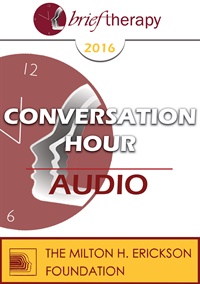BT16 Conversation Hour 07 - Stan Tatkin, PsyD, MFT
- Average Rating:
- Not yet rated
- Topic Areas:
- Conversation Hours | Attachment | Couples Therapy | Therapeutic Process
- Categories:
- Brief Therapy Conference | Brief Therapy Conference 2016 | Pioneers in Couples and Family Therapy
- Faculty:
- Stan Tatkin, PsyD, MFT
- Duration:
- 1:00:17
- Format:
- Audio Only
- Original Program Date:
- Dec 10, 2016
- License:
- Never Expires.
Description
Description: This conversation introduces a polytheoretical approach to couple therapy grounded in secure functioning—a fair, just, and sensitive two-person system. It integrates attachment theory, arousal regulation, and developmental neurobiology. Techniques include supportive confrontation, cross-tracking, and "going down the middle" to engage both partners effectively. Practical strategies are offered for managing distancing and clinging dynamics and building strong therapeutic alliances.
Educational Objectives:
- Learn the philosophies of various practitioners and theorists.
*Sessions may be edited for content and to preserve confidentiality*
Credits
Handouts
| Ericksonian Learning Snapshot (246.7 KB) | 2 Pages | Available after Purchase |
Faculty

Stan Tatkin, PsyD, MFT Related Seminars and Products
Stan Tatkin, PsyD, MFT, is a clinician, researcher, teacher, and developer of A Psychobiological Approach to Couple Therapy (PACT®). He has a clinical practice in Calabasas, CA, where he has specialized for the last 15 years in working with couples and individuals who wish to be in relationships. He and his wife, Tracey Boldemann-Tatkin, developed the PACT Institute for the purpose of training other psychotherapists to use this method in their clinical practice.


